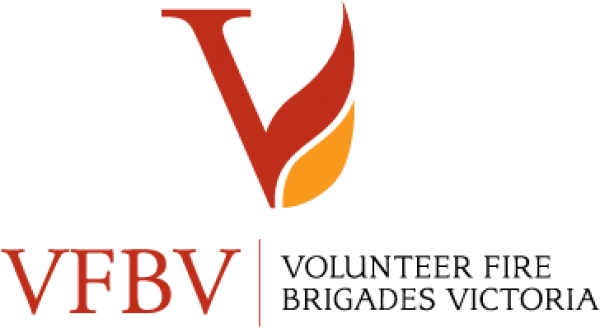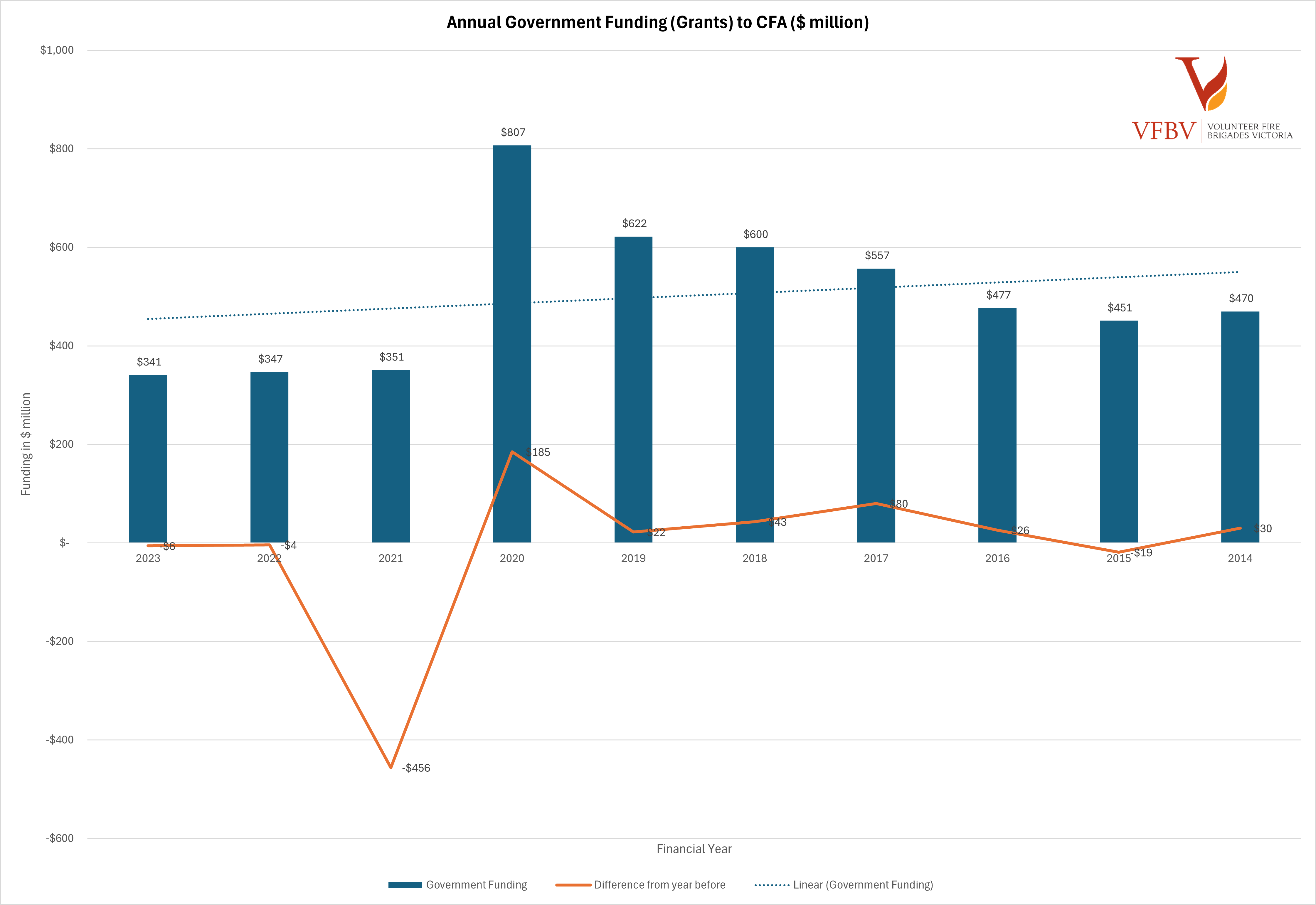Budget questions remain
By Adam Barnett, VFBV Chief Executive Officer
The most frequent questions I am receiving is about the state of the CFA budget. You would be forgiven for thinking that after the handing down of the Victorian State Budget for the 2024/25 financial year last month, that we would all have clarity around the CFA budget for the upcoming year. Sadly, it is impossible to determine what the CFA budget is through the budget papers.
In case you thought that was a typo, let me be clear. Believe it or not, trying to determine the level of fire service funding through the budget papers is an exercise in futility. One cannot help but reach the conclusion that this is by design. American revolutionist Patrick Henry puts it best: “The liberties of a people never were, nor ever will be, secure, when the transactions of their rulers may be concealed from them.”
The reality is – the budget papers do not detail the funding allocations to the fire service, but rather obfuscate and hide these budgets by lumping them all together under ‘Emergency Management Capability’ within the Department of Justice and Community Safety. In addition to CFA and FRV, also lumped into this category are expenses for EMV, SES and Triple Zero Vic.
And because EMV’s budget is secret – there is no transparency about where that funding goes to.
But we can infer some outcomes from the budget papers, and I’ll try to walk you through what we know so far. First, let’s start with the good news.
The Government has continued its support for the popular Volunteer Emergency Services Equipment Program (VESEP), recommitting $15 million for this year’s program. The budget also allocates $18.58 million spread over the next three years to replace 15 CFA pumpers. We certainly welcome and commend these additional allocations.
Unfortunately though, that concludes the good news.
Let’s start with the capital budget. There was no new funding announced for any CFA tanker replacements. So when you hear announcements about MPs posing in front of new tankers – they were the tankers promised back in 2020.
Given VFBV’s estimates that CFA needs to invest at least $30 million a year just to stop the average fleet age going backwards, this year’s commitments are woefully short. This is yet another year where presumably the problem is just tucked under the rug for somebody else to sort out. What won’t go away is the 700 creaking old single cab tankers that still force firefighters to ride on the back of the truck separated from the driver and crew leader.
Some of these are now 35 years old, almost double their useful lifespan. The reality is as these tankers get older and older and are extended so far past their useful life, when they do become inoperable there will be no trucks in the pipeline to replace them. Given it will cost more than $350 million just to replace these aging vehicles alone, the seriousness of the chronic under funding to the fleet becomes clear.
And due to historic under investment, there is limited capacity in the local manufacturing industry to handle large urgent orders for new trucks, even if the agencies decided to order them all tomorrow. So, our warning to government continues to be it is approaching a cliff with potentially catastrophic outcomes if this problem continues to be ignored.
Then we get to CFA base budget. Again, the budget papers offer very little detail, but we can start to make some educated guesses. The budget has allocated the exact same amount to “Emergency Management Capability” for the 2024/25 period as it did for the 2023/24 budget. In other words, not a single extra dollar has been provided in the upcoming budget than was budgeted for in the previous year.
No new money means the budgets have not even been indexed, meaning CPI increases of everyday expenses will have to be absorbed by existing budgets. Using the current CPI means this is an effective cut of 3.6%
Further, it also means any wage increases negotiated into staff industrial agreements have not been budgeted for, meaning all annual increases to wages already approved in current agreements will need to be absorbed. In other words – agencies will need to make cuts elsewhere to afford increasing employee costs.
Then we have the government’s emergency service razor gang. This gang was established by the government last year and is made up of each of the departmental secretaries from the Department of Justice and Community Safety, Department of Treasury and Department of Premier and Cabinet. Calling themselves the “Emergency Services Organisation Finance Board” their job is rumoured to be to identify cuts to achieve another 10% in savings. Given the budget cuts already made to CFA over the last three years, and the historic chronic under funding, this represents one of the largest threats to emergency services in decades.
One can only hope this group looks very closely at the $24.7 million dollars the government has found over the next three years to flush money down the toilet by replacing the current State Control Centre Workforce with a new fulltime EMV public service workforce.
If that weren’t outrageous enough, the cherry on the cake comes from the government announcement that it is hiking the annual fire services properly levy tax to pay for FRV overspends. The increased levy is expected to collect an additional $186 million in taxes from property owners. Given CFA has not received a single extra dollar in their budget, and the levy can only be used for CFA and FRV, it does not take Einstein to figure out that residents in CFA areas are now cross subsidising FRV’s out of control costs for the 85 fire stations they operate, vs the 1,211 stations that CFA operates on just a third of the funding.
Now we get to what I call the long con. The government’s narrative for increasing the FSL is that it has been under collecting. Again it hopes Victorians have very short memories. Remember in 2017 during the height of the controversy over the government’s fire services reforms, and the exodus of CFA and MFB senior executives who, along with VFBV, warned anyone that would listen that the proposed reforms and generous deals would send the cost of delivering paid fire services through the roof?
To divert attention from these predictions, the government back then announced a temporary ‘freeze’ in the FSL, an obvious ploy to trick the general public into thinking the proposed reforms would have no impact on future fire service levies.
Throw in another freeze conveniently attributed to COVID, and then in 2020 it announced it was scrapping differential rates for CFA and FRV (MFB) areas and moving to a new “streamlined” system. In the same year, CFA’s budget was slashed. Under the “old” FSL system – these savings would have been passed onto residents living in CFA areas. But under the new system – these savings were evenly distributed to include residents in FRV areas that were now using the most expensive fire service in Australia.
The objective was obviously to hope the public would not connect this year’s hefty levy increase to the very reforms that hiked up costs in the first place. The MFB budget allocation in 2020 was $461 million, with FRV’s first year of operation in 2021 jumping to $859 million.
Brigades have already started to notify us of public backlash over the increased FSL, and rightly so – therefore it is critically important that members ensure they educate concerned members of the public that none of that increase is going to CFA.
Put the last three years of fire service budgets side by side, and CFA’s annual grant from government has decreased every year for the last three years. Below you will find a chart we have compiled comparing the last ten years of government funding to CFA. (a larger version of the graph can be downloaded at the bottom of this page)
(For a full size picture please click here.)
For members interacting with MPs at public events and functions, don’t allow them to get away with the statement they have invested more in Victoria’s Fire Services than any government previously. This is just another way of saying – they have invested more in FRV than any government prior, while funding for CFA has been slashed.
Now that Victorians are paying for these excesses through increased taxes and levies, it remains to be seen if government will respond to rising anger and concern and reverse its support for arrangements that are clearly not working and are no longer affordable, if they ever were. The secondment agreement should be the first thing thrown overboard.
VFBV is demanding that CFA receives its fair share of the Fire Service Levy, and we will continue to object to residents living in CFA areas effectively cross subsiding FRV’s out of control costs.
While this year’s CFA budget is yet to be announced, members are requested to seek an assurance from their local government MP that they commit to no more cuts to the CFA budget and ensuring CFA’s aging fleet age be addressed. Given they have hiked up the FSL to collect an additional $186 million dollars this year alone, this should not be a hard ask and members should ask how much of this extra revenue will flow to CFA.
You can find your members by visiting the Victorian Electoral Commission website.
NEW CFA CHAIR
I was extremely disappointed to learn of the recent resignation of CFA Chair Mr Greg Wilson, that was announced by government on 23 May.
Greg was appointed to the CFA Board in 2020 following reform and at a time that can only be described as one of the most tumultuous periods in CFA’s history. Greg not only won my personal respect but was broadly admired and respected throughout the VFBV network for his quiet but effective leadership.
Among other things, Greg oversaw the strengthening of CFA’s relationship with VFBV and its commitment to supporting volunteers and was instrumental in re-committing the board to honouring its obligations under the Volunteer Charter which had taken a serious hammering under previous leadership.
I will miss his wise counsel and his steady and reliable stewardship of Victoria’s largest emergency service. Greg has also stepped down from Chair of the SES as he enjoys some well-earned rest post-retirement.
We wish him all the best and thank him most sincerely for his contribution to CFA.
The government has announced CFA Deputy Chair Ms Jo Plummer has been appointed as CFA’s new Chair effective immediately and we welcome Jo to the role.
VALE
We were deeply saddened to learn of the passing of Association Life Member Ex Captain Michael “Mick” Sanderson AFSM on the 4th May.
Mick was a member of the Seymour Fire Brigade for almost 70 years, including significant service to the Association by way of serving as an Executive member to the Victorian Urban Fire Brigades Association (VUFBA) for 22 years, and was a District/Regional Council President of our D12 Council for more than 20 years. Mick was a recipient of the VFBV Gold Star, and was awarded his AFSM in 2008.
Mick was a well-respected member across the state, and was a regular fixture over many decades at State Urban Championships as a judge and official. His passion for encouraging juniors and supporting the Royal Children’s Hospital Good Friday Appeal was well known across the District.
On behalf of VFBV and all fellow CFA volunteers, we offer our deepest condolences to wife Yvonne, daughters Rhonda, Chris and Dianne, extended family, friends and loved ones including all members of the Seymour Fire Brigade.
VESEP

Applications close Friday 14th June 2024
Applications are now open for the 2024 Volunteer Emergency Services Equipment Program (VESEP), with the closing date of 14 June fast approaching.
VFBV has updated its VESEP Help Pack to assist brigades and groups with their VESEP applications. The Help Pack is available for download from the VFBV website.
VESEP provides grants of $2 for every $1 of Brigade or Group funding to assist brigades and groups in acquiring a wide range of additional equipment in recognition of the significant contribution emergency service volunteers provide in supporting Victorian communities.
Now in its 24th year, VESEP first started out as the Community Safety Emergency Support Program in 2000 and was designed in close consultation with VFBV, with the intent being a grants program designed by volunteers with minimal administration required from volunteers.
VFBV wishes all CFA Brigades and Groups well with your applications and thanks you for your untiring service to Victoria!
SOP feedback

A reminder that we are seeking feedback on various Standard Operating Procedures (SOPs) that are out for consultation. Thirteen SOPs have been modified and 10 are now available for review.
These are SOP 3.01 Management of Junior Members; 5.05 Use of CFA Equipment; 7.01 Local Procedure Development; 7.05 Water Supplies for Firefighting; 7.07 Station Siren Use; 8.01 Incident Controller and CFA Agency Commander; 8.04 Transfer of Control; 9.13 Keeping Logs and Documents; 9.16 Media Management; and 9.18 Use of Personal Mobile Devices During Incidents.
Given the importance of SOPs in CFA’s operational doctrine, VFBV encourages all senior volunteers to make themselves familiar with the proposed changes and provide feedback ASAP.
Please visit the VFBV website to access the draft SOPs. A feedback survey is also available from the VFBV website for those who prefer to provide feedback that way.
VFBV Board positions

Vacancies on the VFBV Board will arise wen the terms of four VFBV Board members expire on 1 October 2024. Of the four members whose terms are expiring, two are eligible for re-appointment.
VFBV invites applications from any CFA volunteer who is motivated by the prospect of making a difference and believes they have the skills to contribute to the VFBV Board.
The role of a board member involves contributing to VFBV direction, policy determination and monitoring the performance and governance of the Association. This includes actively contributing to policy discussion, consulting with CFA volunteers and contributing to the identification and management of strategic issues.
VFBV is seeking applications from gender and culturally diverse candidates in addition to a diverse range of skills and experience including applications from diverse brigade types and classifications.
Members should familiarise themselves with the VFBV Board member role statement and key selection criteria available from the VFBV website or via the office at (03) 9886 1141.
Applications close on Monday 2 September 2024.
‘Give us a hand’ campaign
This year’s CFA recruitment campaign continues, with a toolkit having been developed to assist brigades tailor and customise the various resources available.
Members can download and link to videos, tailor social media tiles, or customise a recruitment flyer or poster you can use in your local community.
Stock photo’s and audio are also included to assist the campaigns keep a consistent look, but allow brigades to tailor to their specific circumstance. Our delegates to the Joint Member Services Committee have been please to contribute to the suggestions, and encourage brigades to use the resources available to assist with local recruitment drives.
Volunteer Unity
Again in 2023/24, CFA Brigades and Groups showed it is more important than ever that volunteers have a strong, united, independent and credible voice with almost 95% of Brigades demonstrating strong support for VFBV’s important work representing and advocating for all CFA volunteers. Thank you to all brigades and groups who affiliated last year.
Brigade and Group secretaries have received the 2024/25 renewal notices for your Brigade/Groups’ VFBV Affiliation and Welfare Fund subscriptions with a due date of 30th June, 2024.
The Board is determined that brigades/groups should benefit from the strong governance of the association and have reduced the affiliation rate from $84 to $75.
Those who pay VFBV affiliations before 30 June will be automatically entered into a draw to win one of four extremely worthwhile prizes valued at approximately $4,000. Prizes have, for the fourth year running, been donated by GAAM Emergency Products and Powdersafe and we sincerely thank them for their continued support.
We strongly encourage Brigades to also subscribe to the VFBV Welfare Fund. The Welfare Fund is a capital fund and an exclusive benefit to affiliated members with VFBV funding all the administration and operating costs ensuring 100% of funds received go directly to CFA volunteers experiencing personal hardship. The VFBV Welfare Fund provides small grants up to $5,000 to assist volunteer members and long service ex members. The Welfare Fund has distributed more than $2.5 million dollars to volunteers in need since its inception.

Quarterly Supplement

Included with the June 2024 edition of Fire Wise is the latest edition of the VFBV Quarterly Supplement.
The Quarterly Supplement contains 16 pages of relevant news, updates, information on current issues being pursued by VFBV on behalf of members. It also includes additional resources or updates that are available via our website.
An electronic copy of the Quarterly Supplement can be downloaded here.
Brigade Captains and Secretaries, Group Officers and Group Secretaries as well as VFBV delegates are requested to please take the time to read this and future editions, and table at your upcoming meetings for the benefit and knowledge of your members.
Leading for Better Mental Health

The Emergency Services Foundation (ESF) has announced it has received funding for three ‘Leading for better Mental Health’ programs for 2024.
The Leading for Better Mental Health (LfBMH) program was developed from a comprehensive literature review, extensive consultation and targeted evidence gathering activities to understand the gaps between leadership for mental health leading practice and current agency activities.
A unique element of the Leading for Better Mental Health program is that the facilitators meet with participants in advance to understand their individual leadership challenges and expectations of the program. This provides a deeper understanding of the working environment and cultural issues to tailor the program to meet the specific needs of the group. This approach serves another purpose. It demonstrates how reflection and conversation can be applied by a team leader. It helps to build a trusted relationship that carries into the program and its coaching element.
Each program has a maximum cohort of 25 participants, and involved four days face to face over a 12 week period and is available to all current and emerging emergency service leaders, including Group Officers, Captains and Lieutenants.
To find out more, or apply, please visit the ESF website.
Recent articles on the VFBV website
National Volunteer Week 2024
2024 VESEP Applications Now Open and VFBV Help Pack
Feedback Requested – Standard Operating Procedures (Various)
Presumptive Legislation Update
Enjoy the VFBV monthly newsletter?
If you enjoy reading the VFBV newsletter each month, why not share it with your fellow volunteers?
Either share this page with others who may enjoy the articles or encourage other volunteers to sign up to receive their own copy via email each month here.
Want to read the VFBV 2-minute briefings from the CFA/VFBV Joint Committees?
The latest edition along with previous editions can be downloaded from the VFBV website here.
 Championships
Championships 

